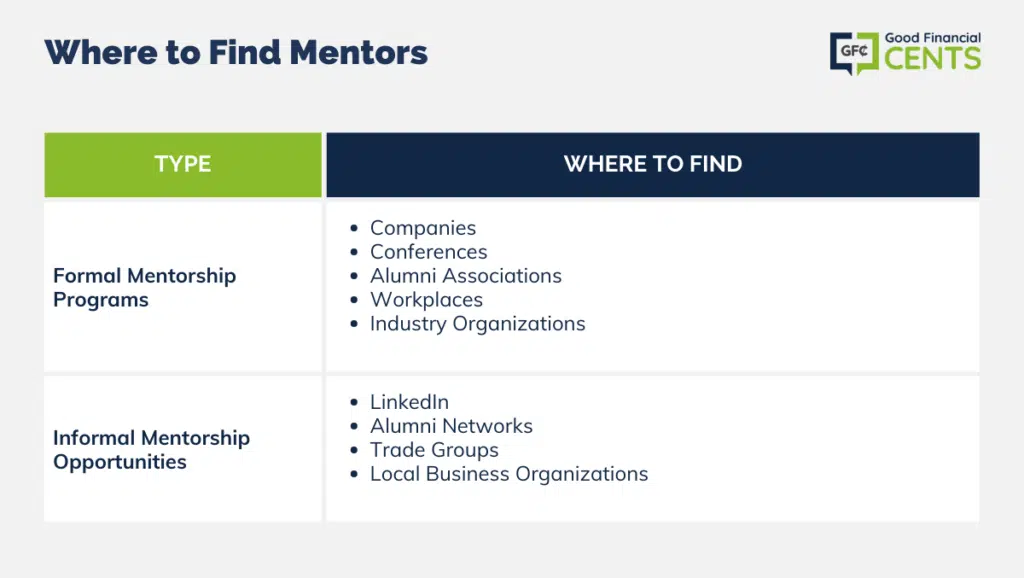You’ve probably heard that finding a mentor is one of the biggest steps you can take to help your career. According to one study, mentees who participated in a five-year, company-sponsored mentorship program were promoted five times more often and were five times more likely to see a pay boost.
But much like going to the dentist, it’s something that most entrepreneurs know is a valuable step, yet is often put off indefinitely. How do you even find a mentor, after all? Here are a few tips to find a meaningful mentor for your business.
Table of Contents
Where to Find Mentors
The most important thing to know about mentorship is that it’s a relationship. Done right, it’s really more of a friendship than anything. And not everyone is ready for a friendship just yet. That means you’ll need to be prepared to reach out to many people in the hopes of finding the right mentor.
Formal Mentorship Programs
There are also two general types of mentorships. First — and easiest to use — is a formal mentorship program. You might find formal mentorship programs in places like:
- Companies
- Conferences
- An Alumni Association
- Your Place of Employment
- An Industry or Trade Organization
- A Nonprofit Dedicated to Education and Career Assistance
These programs can be especially easy to find a mentor through because people are already pre-vetted and willing to serve as mentors. The downside is that there’s no guarantee you’ll be paired with someone who can best help you reach your goals.
Informal Mentorship Opportunities
Some of the best mentorships arise “organically” — i.e., without any outside intervention. It’s an agreement — formal or not — between you and another person who agrees to help you over the long term.
These types of mentorships can be among the most valuable because you can seek out the best person to help your specific goals (assuming they’re willing to help, that is). They can also be some of the best relationships. If your mentor is up for it, they can last a very long time.
But since they’re not a part of a formal program, they can also be some of the hardest mentoring relationships to find. Here are some places you can look for informal mentors:
- Alumni Networks
- Trade Groups or Nonprofits
- Local Business Organizations
In short, you can find informal mentors in most of the same places as formal mentors. You’ll just need the skills to approach people individually and see if they’re willing to help you.

How to Start a Mentoring Relationship
It can be nerve-wracking to approach someone and ask them to be a business mentor. After all, it can be a big time commitment, and not everyone has that kind of free time. But there are several things you can do to boost your confidence in approaching a potential mentor.
Be Clear About What You Want
One of the biggest things you can do is to be really clear on your goals. You’ll need to know in what general direction you’re looking to go in your career, whether that’s leading a wildlife research team, covering international news stories, or making computer software more secure at a big tech firm. It’s OK and even healthy if this evolves over time, but you’ll need to start somewhere.
It’s also a good idea to know what specifically you’re looking for help with.
- Do you want someone you can regularly meet with?
- Are you looking for someone you can come to with questions as they come up?
- Do you need help with learning a new piece of technology, want feedback about a product idea, or need advice on an unfamiliar new business venture?
If you’re clear about what you’re looking for, it can help give you the confidence to move forward.
It’s also important to note that a mentor is not necessarily a coach. You’ll need to be committed to doing the things your mentor helps you with. But they are not the people who will give you homework and then hold you to it.
Start Meeting People
Once you know where you’re going, you can look for potential mentors who might be best placed to help you get there. Reach out to one or two people at a time and ask for an informational meeting.
Tell them you’re thinking about an idea or starting X, Y, or Z business and would appreciate a bit of their time if they can spare it. A good place to meet (in normal times) is a cafe for a “coffee chat,” and it’s nice to pay for their coffee.
Nowadays, zoom calls are acceptable, but it’s still a kind gesture to send $5 through Venmo. Here’s a sample quick email template you can modify:
Hello,
My name is ___, and I just wanted to drop you a quick note to say hi. I have a business in ___, and I’ve already _____.
I see that you’ve been in this industry for a while and that you do ___, which I’m also interested in.
Would you be willing to meet up for a coffee chat sometime? I’m happy to Venmo you $5 to pay for a “virtual coffee” for your time. I’d greatly value your time and expertise.
Let me know. Thank you, and have a wonderful day!
Once you’re at the meeting, it’s good to take this time to get to know them. Don’t be weird and bring up the “M” word right away. That’s a big ask, especially if they don’t know you.
Bring up a business problem or two that you’ve been having and ask for advice. At this point, it’s networking more than anything. Even if this person never becomes your mentor, it’s still a win because now you have someone else to include in your network.
Extending the Relationship
At the end of your meeting, ask the person if you can come to them for business advice again in the future. If you’re looking for someone to meet with regularly and the person seems open to it, you can ask them now.
Often, you might just be looking for a mentor you can come to in the future with questions as they come up rather than sitting down for regularly scheduled meetings, and that’s OK, too. Either way now’s a good time to open the door for future meetings.
Focus on What You Bring to the Table
Starting a mentoring relationship is often awkward. There’s a weird power dynamic there between you and someone who may hold the keys to your future business. It’s OK to acknowledge this but don’t let it stop you from reaching out to mentors.
After all, mentorship isn’t a one-way street. Your mentor gets something out of it, too. It might be a free coffee once a month or even just the reward of helping someone with interesting ideas. In any case, look at it more as a business friendship, first, because that’s what it’s really about.
The Bottom Line – How to Find a Business Mentor
Navigating the world of business can be a challenging endeavor, but with the guidance of a dedicated mentor, the journey becomes more manageable. The act of finding the right mentor requires persistence, clarity of purpose, and mutual respect.
Remember that mentorship is a two-way relationship built on trust, where both parties benefit and grow. As you embark on this exciting partnership, cherish the wisdom, insights, and support you receive, and always be prepared to give back in whatever way you can.
Through such symbiotic relationships, not only do careers flourish, but enduring bonds are formed that can shape the future trajectory of any budding entrepreneur.







